Ian Thornley talks Secrets, guitar gear and nearly joining Velvet Revolver
The Big Wreck mainman on going solo

Introduction
The world has too many unsung heroes of the guitar - players who never get their dues or cross the geographical and musical divides to reach the wider audiences they deserve. And with his first solo album, Secrets, Ian Thornley has reminded us again what a rare songwriting and playing talent he is.
It's little wonder Ian has other guitarists including Alter Bridge’s Myles Kennedy and Black Stone Cherry’s Chris Robertson singing his praises. And even though he might still be a new name to many in Europe, this is another record that deserves to change that.
The Canadian is better know in his home country as the leader of Big Wreck, the 90s alt-rock band who officially reformed in 2012 with the release of acclaimed third album, Albatross. But the excellent Secrets – as Ian Fletcher Thornley – is a very different affair; the Mark Howard-produced (Bob Dylan, Tom Waits) record is intimate and acoustic where Big Wreck is often layered and heavy.
Ian spoke to us in depth about his deeply personal album, passionate approach to gear and technique as a player, and how he nearly ended up as Velvet Revolver’s singer.
Don't Miss
Famous firsts: Big Wreck's Ian Thornley
Alain Johannes talks lessons learned with Homme, Cornell and Lanegan
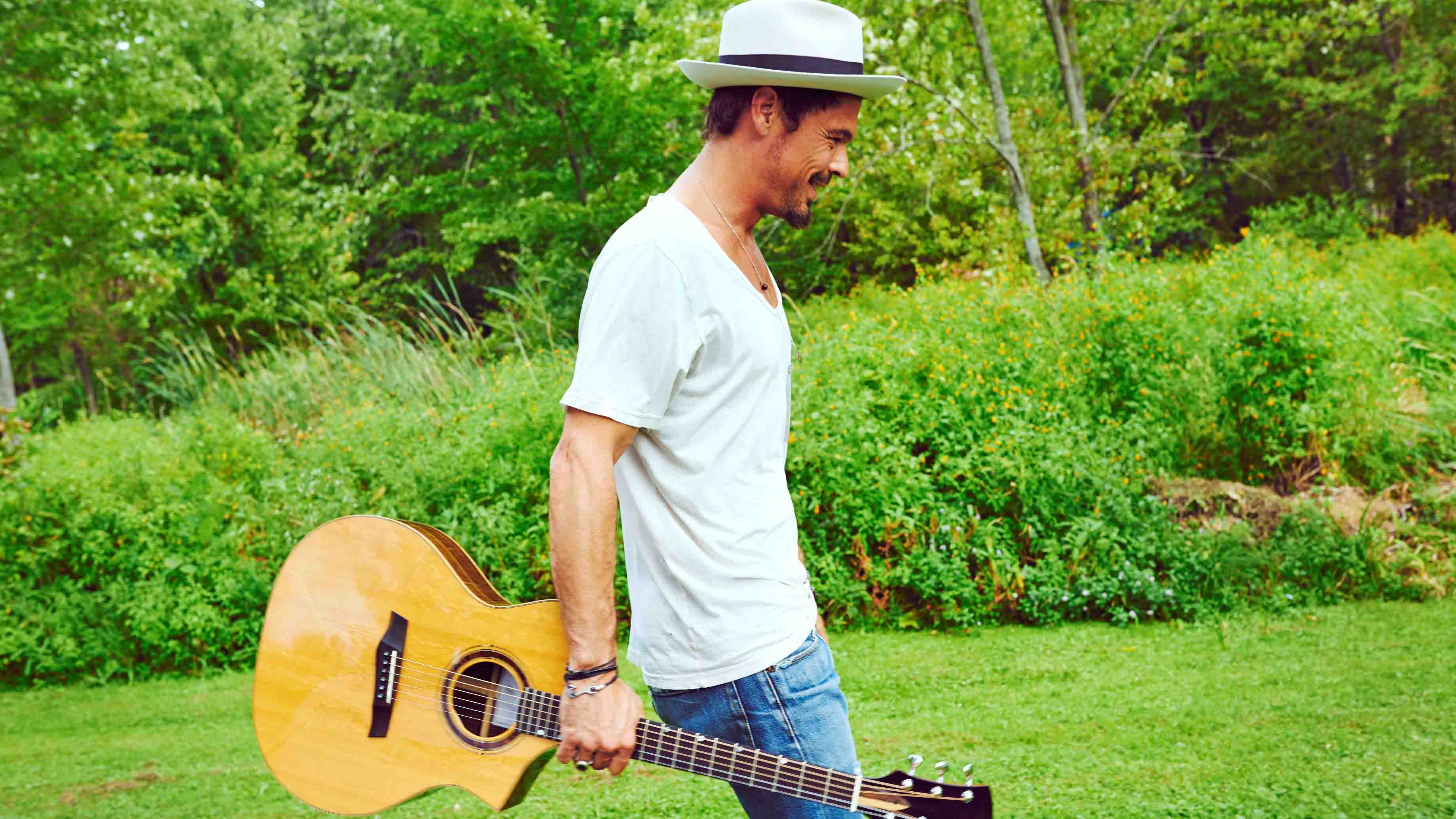
Flying solo
Is the solo album something you've wanted to do for a while or a project that's been an ambition in recent years?
“It's something I've definitely wanted to do for some time. I hadn't really imagined it turning out the way that it did, but I always wanted to do a strictly acoustic record.
“Through the years, I'd write things occasionally – either an instrumental piece or something I'd eventually put lyrics to – that would really fit into an acoustic, fingerstyle vibe, with maybe a lot of slide and dobro. I would always stockpile these songs thinking I would get to it. We had a bit of a break in time with Big Wreck and I figured, why not now.
“So it just kind of opened the dialogue, instead of just talking about it. But I thought, I don't know if I'm really a fan of those kinds of records for the most part, because when they're done by a rock 'n' roll guy, I generally don't like them.
The whole thing was recorded and mixed in 12 days, so it was a really quick process
“Mark Howard's name had been kicked around for at least five years. I remember talking to Mark five years ago about working together. Once he was attached to this project, we thought, 'Okay, what if it was a Mark Howard acoustic record?' Which means it's going to have some really interesting textures and vibe, and an atmospheric take on it.
“It started to take form rather quickly. At least in my mind. Then it was just a matter of getting the players and running the songs. The whole thing was recorded and mixed in 12 days, so it was a really quick process.”
Did any of the songs change dramatically from your initial demos?
“Yes, three of the songs I had done previously with Colin Cripps. With those, I really liked the way that they were, and they were almost entirely acoustic. But I didn't really demo too many of the other songs.
“The ones we did with Mark, which are the lion's share of the record, I would have, for the most part, the basic changes: the basic guitar part and then the melody and most of the lyrics done. Over the years, I would have demo'd a guitar part with a melody and maybe a lyric line. But several of them would be very stripped down and acoustic, so they did sort of grow from that.
“But as I said, once I started imagining the record and how it was going to be; I sort of let the demos go and moved forward to stay in the moment with that. So there was no demo-itis. I would suffer that a lot more with a Big Wreck album, where every song has been demo'd and the recording of it is basically doing the demo but better.
“This wasn't that: the demos would serve to remind me, 'How did I play that again?' Or, 'What key was that in?' They were just reference points as far as the song point, and then, of course, even that would change when we started going through the song in the room.”
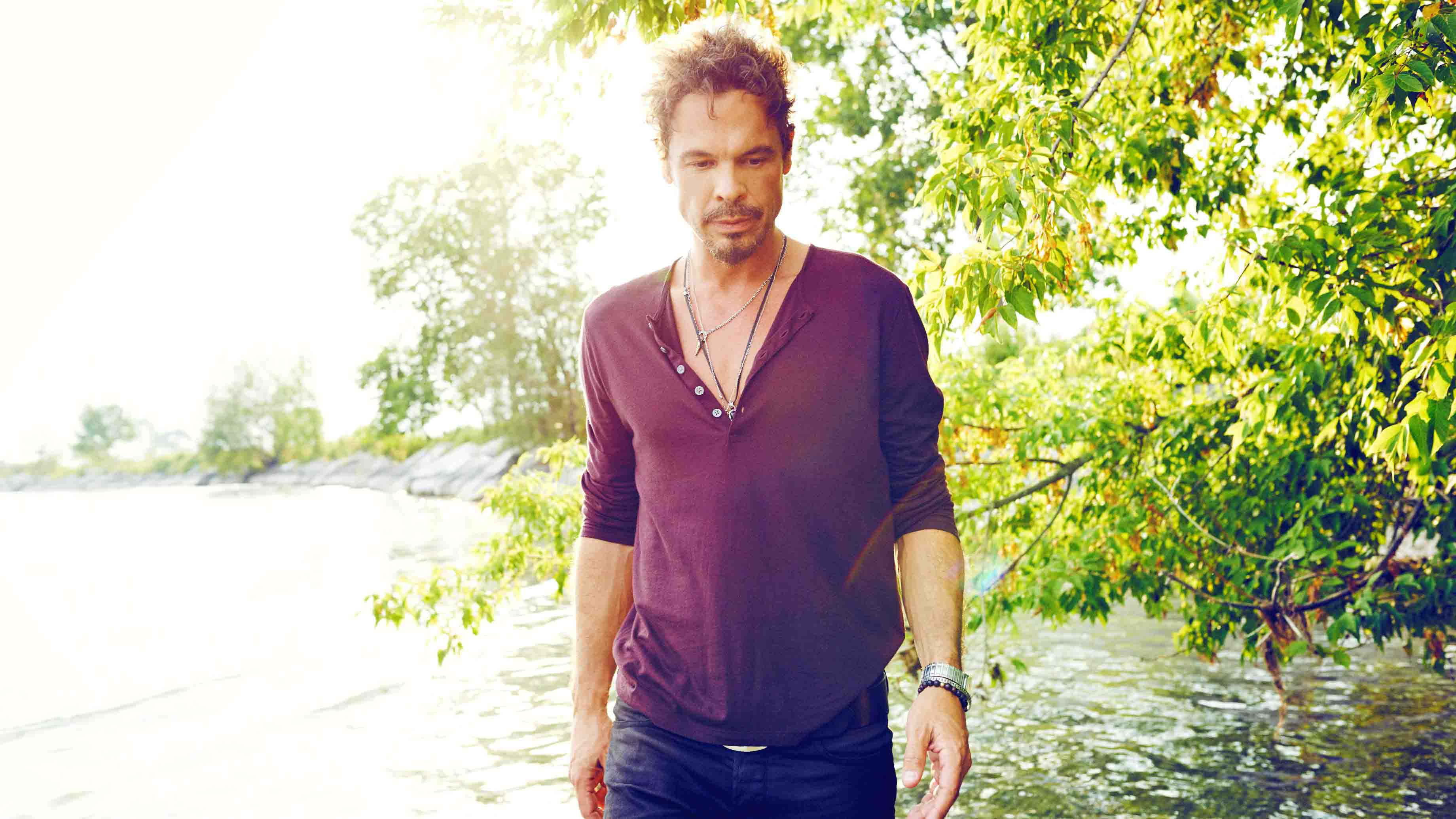
Getting intimate
The really intimate moments on this album are striking; do they hark back to early acoustic Americana and blues influences for you?
“Maybe, maybe. I don't know, man. Certainly, you are a product of your influences, and at your most intimate and honest moments, the language that you use to communicate with is the language that you've learned from your heroes. So, I would assume me at my most stripped down and intimate would echo that kind of thing. Be it Bruce Cockburn or Chris Whitley, or even going further back to Mississippi Fred McDowell or something like that.
“It's hard for me to really say at this point, because the record on the whole is a very intimate and personal record. There was a lot of stuff going on in my personal life in the last year, and it was really right at the surface when we were recording the record. So I haven't really listened to it as much as I normally would, say a Big Wreck album where I go over it and I comb through it.
The language that you use to communicate with is the language that you've learned from your heroes
“This was really literally a snapshot of a moment in time and there's a lot of honesty on it. It's very raw and very unpolished and that definitely speaks for the authenticity of it in a way. Intimate is a good word, and it would be hard for me to listen to those intimate moments and hear past where I was when I did it and hear what I was being influenced by. I could do it maybe as I get further away from it, maybe in a few months.
“Now, when I listen to it, I get brought right back to the place where I was when I cut the song. And some of those are very sensitive times for me. There's a lot of weird shit going on, so it's hard for me to dissect that record. It is difficult for me to listen to unless I'm in the right frame of mind.”
Did you have reservations about being so honest on record?
“Very much so. I still tend to hide behind metaphor, but I just figured it was time to really let go of the sort of OCD of wanting everything to be a case of, 'No, do it again. No, do it again. Now it's perfect. Double it.' For me to get away from the idea of, 'I love this part of the song; do you know what would be even better, if we put this on top and then we slide this in the middle so it contrasts.'
“It was hard for me to let go of that and just trust Mark. The guy had made some of the most important albums in history, at least for my tastes and in my world, so you trust when someone carries that kind of weight. You trust his process, and it's very different from my own. You have to have room for that, and you have to sort of man up and let go. And there is a freedom in that, if you embrace it. It took a while, and it was a bit of a headtrip to change the whole thing.
I try to hear the time and place, as opposed to the fact that I can hear someone turning a page in the middle of the first verse
“Even with the recording of the vocals, I'm used to a very different vocal sound. I'm used to something that's very compressed and will bring my quieter moments up and bring my louder moments down. But with this, I was turning almost 360 degrees at certain points, because the mic was just on and it was hot. So, if I just went right up to the mic off axis as I normally do, I would have blown something up. So, I was singing in the same direction the mic was pointing for most of the higher stuff.
“It was a very different process, very honest and revealing. There's something cathartic in that, too, to have everything be that naked. Now, if I'm in the right frame of mind and I do listen to it, I try to hear everything else. I try to hear the time and place, as opposed to the fact that I can hear someone turning a page in the middle of the first verse, or adjusting a seat through the drum microphone, or the chair I was sitting in when I did the guitar did a little creak. That will eventually, hopefully rest to a place where I find it endearing and even more assist in it staying honest and true. Keep it as a snapshot in time.”
Do you think this album might change your creative process in the future, or is there a specific way of working with Big Wreck that just works for you?
“I don't know. I hope some of it seeps in. I must admit, as soon as I was done, I said that I can't wait to make something really heavy! I need to make something low-tuned, heavy and triple-tracked. But that's your initial reaction when you come out of something that's so different. I have room for all of it, I really do.
“At the end of the day, it's just art, just music, and it should be taken as such. How you get there is really… once it's done, who cares, right? It's the music and the statement, feeling and vibe that counts. More than how comfortable or uncomfortable you were doing it. If it was something I was really uncomfortable doing, I probably wouldn't have released it.
It was very quick and instinctive, and our instincts were all tuned to the same frequency
“But [there was] the live aspect of it – and it's very live because the whole record was done with myself, [drummer] Glen Milchem and [bassist] Dave McMillan [who plays in Big Wreck too] sitting facing each other and running the song. We'd run it through a few times until we got one that we thought was the one. And that was basically it. They were really exceptional musicians and easy to work with. Nobody really had to take an instruction or anything. It was very quick and instinctive, and our instincts were all tuned to the same frequency, if you will.
“It was a great way to work in that regard, and I look forward to maybe letting some of that seep into the next Big Wreck album. We do a lot of laying down the bed tracks live, or at least as much as we can. But the problem is I'm such a fan of effecting the drums in different ways and doing different things with the guitars, and if there's mic bleed from a scratch guitar on there that's going to get in the way… but there might be a happy medium to be found. I would certainly hope that it ekes its way in to the next project, the next Big Wreck album.”
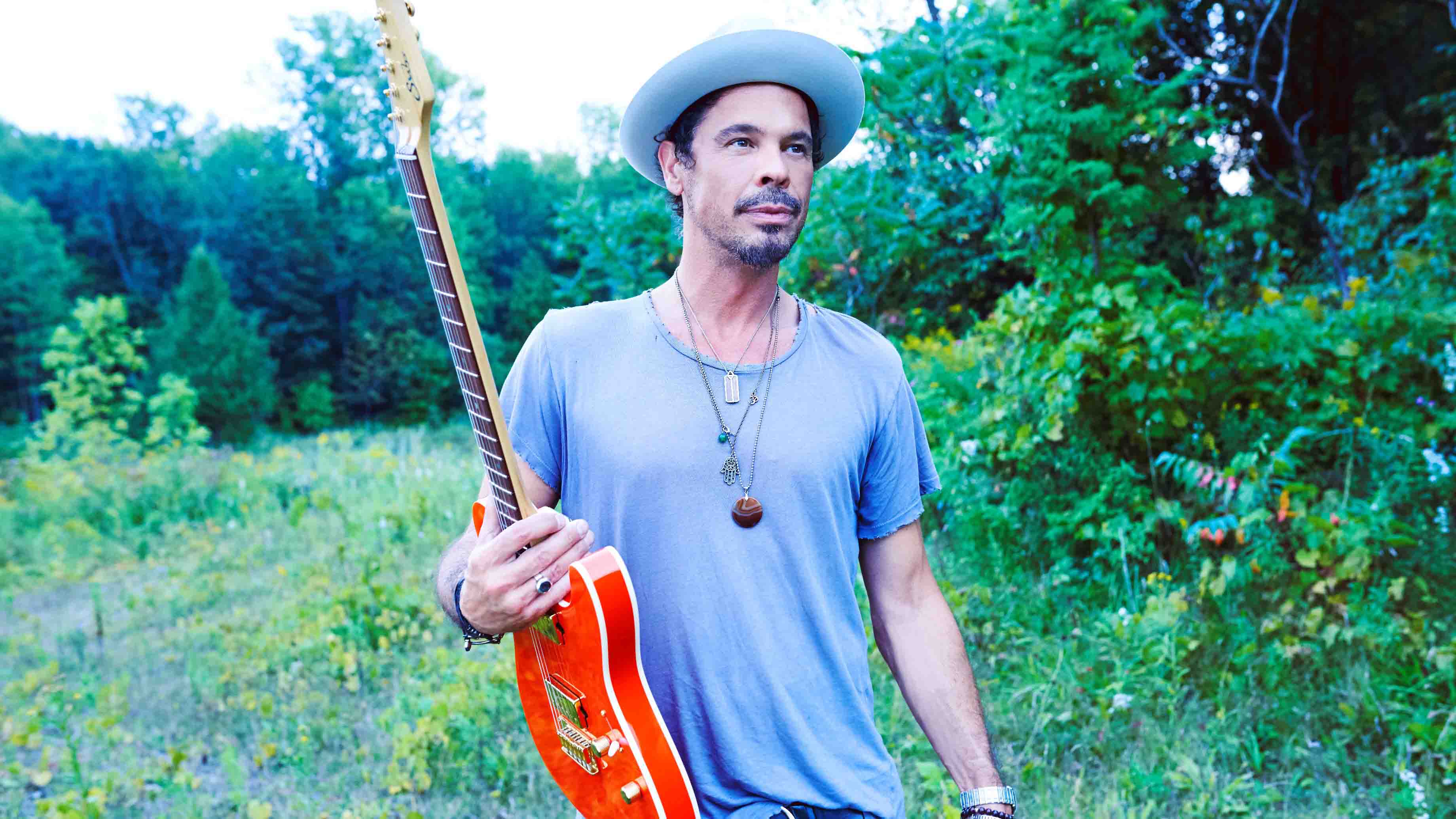
Secret weapons
The songs On My Way and How Long have a layered, folky feel to them; is that a mandolin in there as well as guitar?
“Let me see… we had a mandolin, we had a ukulele, something called a Merlin [made by Seagull], which is basically a dulcimer. That's what I think I used in How Long, the Merlin. It's very simple – just a piece of wood with some strings on it – but it has this twang if you bend the strings and stretch them with your left hand and do a little vibrato, a little bend. It can sound almost Eastern.
“I think it was the combination of those three instruments. Where I would normally overdub an electric guitar part, it was more a case of, 'Let's try to build it up and make it big, but with other highly tuned string instruments.'
I never thought I'd be a fan of the uke, but man, it's a great noise
“I never thought I'd be a fan of the uke, but man, it's a great noise. It records really nice and it just adds a sweet top-end. And of course I was retuning them all per song. I always love the sound of open strings ringing when you're playing, and certainly overdubbing strumming parts. It was a lot of fun building a symphony of all these little misfit toys.”
What were your key acoustic guitars for the sessions?
“Basically whatever's around. I know that Mark had a beautiful old Martin from the 40s, but I don't think we ended up using it. I had this Loucin guitar, a luthier just outside of Toronto here who makes beautiful instruments, and he's currently building me one, but in the interim he's loaned me the 'shop' guitar which I think is one of the first ones he made.
“That Loucin six-string was the main guitar for the record as it's a beautiful-sounding and playing guitar. That guy really knows what he's doing. He really knows his woods and is an expert craftsman, for sure. There was also a Cole Clark 12-string, a Yamaha 12-string, and then for electrics it was basically Suhrs, and I had a couple of my Mouradians up there, too.”
Is that a Suhr on Frozen Pond?
“I believe so, the real Strat-y sound? That's either my orange Suhr or one of the Mouradian Flapjacks I have; it really does a great Strat-y quack. It would have been one or the other; I think we were getting hum out of one of them.
“We recorded it in a cottage up in the north [of Canada], and with the power you never knew what you were going to get. Sometimes it would be, ‘Wow, the amps sound great,' but other times it was, ‘What is that weird high-pitched squeal?!' Guitars were reacting differently on different days depending on what was going on with the amps, and the pedals. I would probably lean more towards the Suhr because it has that real juicy, sweet thing John does so well.”
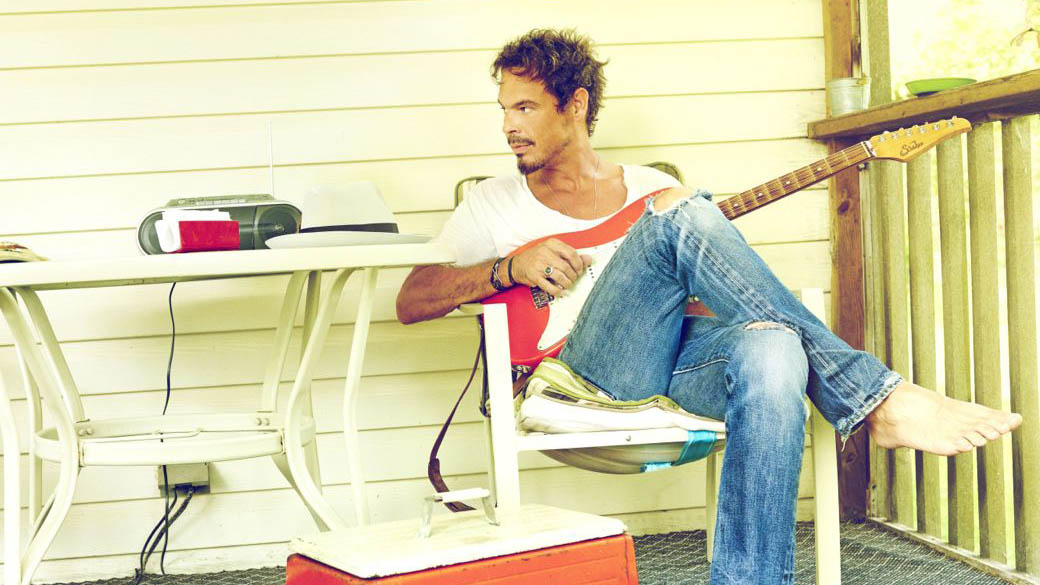
Knack of the Knopf
Listening to your tone and fingerstyle approach on that song, is it safe to say Mark Knopfler was on your mind?
“He's a huge influence. That's what I was going for there. I don't think I hear any direct rips, any lines, but of course, that is me doing my best Knopfler. I don't have a pick; I'm just doing my best Knopfler thing because frankly, I dig the way it sounds. And I dig what that vibe can bring to the song. That's the hat I put on for that tune, because of all the things I can do on the instrument, that's the one that I thought would work best for that. It's a fun thing to do.
“It's hard for me to get into the headspace all the time, like any influence I have; sometimes I can really get into a headspace when I can, not so much play like a particular player, but really get close to that tone, that vibe or feel. Sometimes it just happens and sometimes you're trying and trying. But I think a lot of it is down to the music, what you're playing, too.
“But definitely, that was a Knopfler thing. I really enjoyed the tone on that, too. Those Suhr amps – I took a Bella and a Hedgehog – those things do that beautiful Fender chiming bell but still juicy and warm… they do that so well. John's really got that figured out over there.”
They seem to be incredibly versatile amps.
“Yes, and deceptively simple, too. He's really got it figured with what are the most useful sounds, and things that take pedals well, things you can build on. I'm madly in love with everything that guy does. He's a tremendous builder and scientist; he's a mad scientist, for sure. Brilliant, brilliant guy.”
When you get to a point in a song where a guitar choice needs to be made, do you usually have something in mind for the sound you envision, or do you tend to reach for what you have close at hand?
“That's a good question, because I could only bring so many things up to the cottage. It's not like we had a big truck pulling a bunch of stuff up there. So, I brought a few Suhrs and a Flapjack or two. I think I had a Duesenberg with whammy bar on it, too, for a song.
“Most importantly, when it comes to recording, I need things that are reliable. I need things that aren't going to require a lot of neck adjustments, and won't need a lot of setup time. Because the spontaneity has to be there, and if I need a sound that's like X, and you pick up the X guitar but it's like, 'Hang on, I've got to set it up…' then it could be gone. So, it's basically surrounding yourself with the things I know are very reliable and are going to work.
When it comes to recording, I need things that are reliable
“And that's the great thing about the Suhr stuff: if I need something a little bit hotter, I had a Classic T up there with two humbuckers that I used for some of the slide stuff. But it could be used as a chording guitar as well. Anything I would reach for would be reliable. Certainly, the Mouridian guitars I have are tip-top. I could pretty much cover any of the sounds that I would normally go for with what I have.”
The slide work in the closing section of All Along (For Sophia) is another highlight on the record; was that something you had in mind for the song early on?
“It just sort of popped out as we were cutting the tune. I liked vamping on the two chords at the end. It was very quick, very organic. I thought, 'What if I just vamp on the two chords at the end and we have an outro at the end that we have an old-school fade out on?' As you start listening to it and Mark's doing his moves, you wonder, 'Should we do a slide solo at the end?'
“Certainly, with the lyrical content of the song and what I was saying, what it means to me personally, I thought if there was a guitar solo at the end it would make a lot of sense and be a great statement. So, I grabbed my orange Classic T, did two or three takes and we just picked the third one. It was pretty quick. I liked the tone and we just pressed record.”
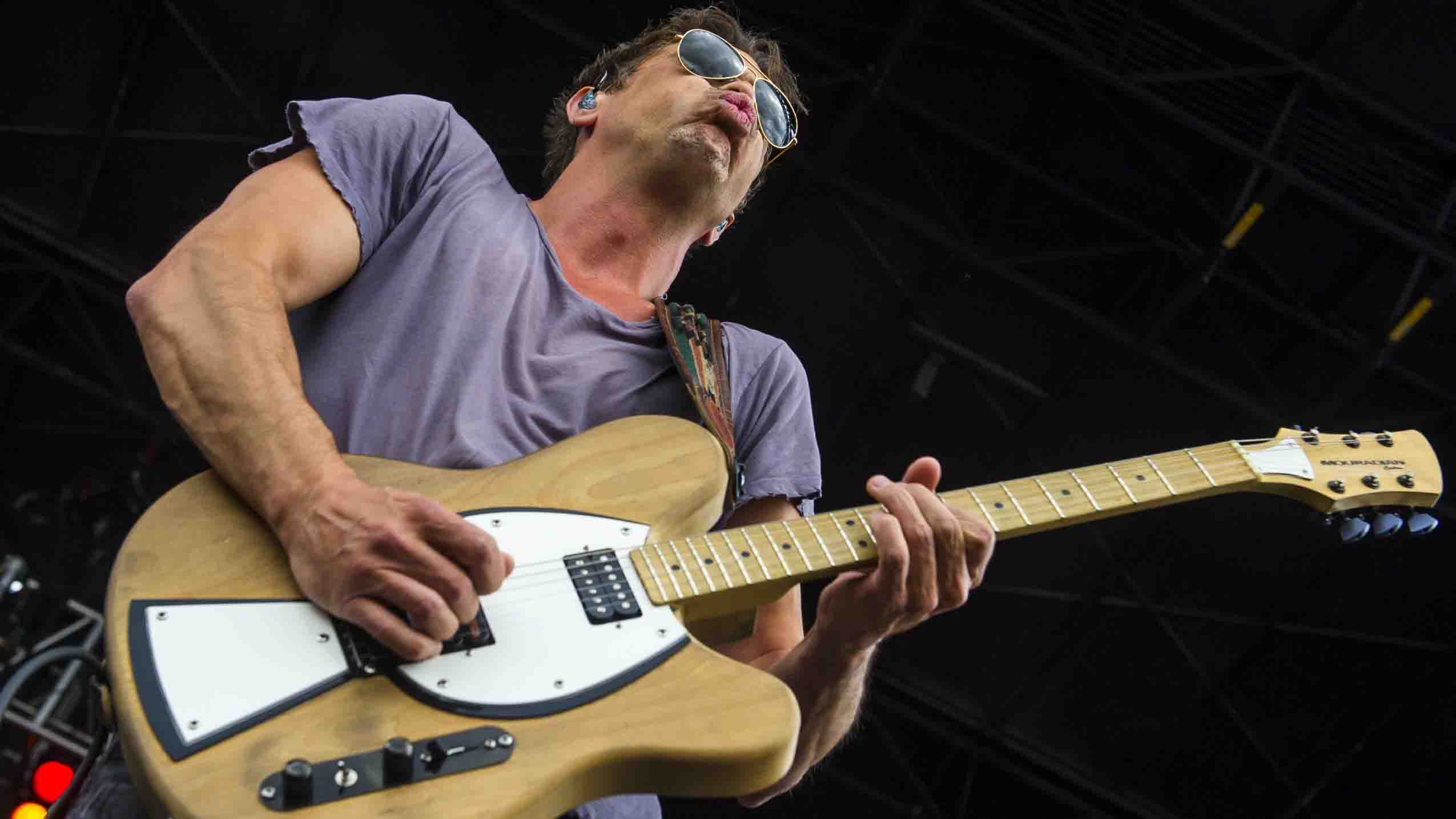
Unsung heroes
You've performed with Alain Johannes before, and he's a big fan of cigar box guitars; has he been getting you into them, too?
“Oh yeah, I picked one up this summer in LA. I was at his place, and he's right when he says they're writing machines. You pick one up and ideas for songs just pour out. In my place, there's one that's always on the coach. I sit down and plunk around on it. I certainly can't do on it what he can, because he's got all these flamenco chops.
“It is a great noise, and I'm a big fan. Matty Baratto makes them in LA. Apparently he made one for Sir Paul. He saw Alain's and said, 'I want one of those,' and Alain had to say to Matty, 'I hope you're sitting down, but Paul McCartney wants one of your cigar boxes.' They really are a great tool. I have to get a pickup in mine because I want to bring mine out on the road.”
You and Alain could both be called unsung heroes as players, especially from a European perspective. Would you like to play more over in Europe?
“Absolutely. I was recently over in the UK doing a couple of guitar clinics and I just think the vibe is a lot different over there where music is concerned: how people listen to it and what they're listening for. It's just very different to how it is over here. And certainly in Europe, in Germany, we had rabid fans coming from all over the place.
“We did five or six shows, and it was sometimes 60, sometimes 80 people in the audience. And it didn't matter, because people were coming from far and wide, and these people were real fans. They weren't there because they heard some catchy number on the radio; they were there because these albums had meant something to them. And that's a really cool thing.
“I have a lot of friends that do festival shows all over Europe, and they're always amazed at the line-ups; they'll be so varied. They want good music, and they don't care if it's this or if it's that. It's not about everyone sounding the same and using the same guitar sounds, and the same four chords - singing about the same things. It's more about, 'Wow, that is different.' That excites me, and I would love to get out there more. I would love to get over to there more; I would love to do stuff in the UK.”
“In Germany, we had the whole band playing over there, and did a stripped-down, combat-rock version of our show with us all playing little amps and tuning between songs on tiny stages with no in-ear monitors. I quite enjoyed it – it was a challenge, but it was cool and it was fun.
People were getting off on the fact it was five guys improvising together, and not one guy wanking over a chord
“One of the things I came out of that group of shows with was, when we play live, I'll go off on a tangent and play a solo or whatever, and it wasn't just the guitar pyrotechnics – all the guitar athletics – that was getting to people. It was the fact it was the whole band; it was a jam. It seemed that people were getting off on the fact it was five guys improvising together, and not one guy wanking over a chord while the guys hold it down.
“It seemed like the areas where we would get more and more into and get further out would get a bigger reaction from the audience than, say, something that did really well on the radio, or indeed, a really ripping solo that has eight bars in the middle of a song. It was more about the building of ideas, and real improvisation was something that wasn’t lost on people over there that I think can get lost…
“I'm not slagging the audiences over here [in Canada], but I think it can get boring to people who just want to hear, 'I love That Song'. Which is fine, too, I'm down with that. I love it all, but it's nice to be able to do it all and have it all be appreciated. So, a long answer, but I'd love to do more stuff in Europe!”
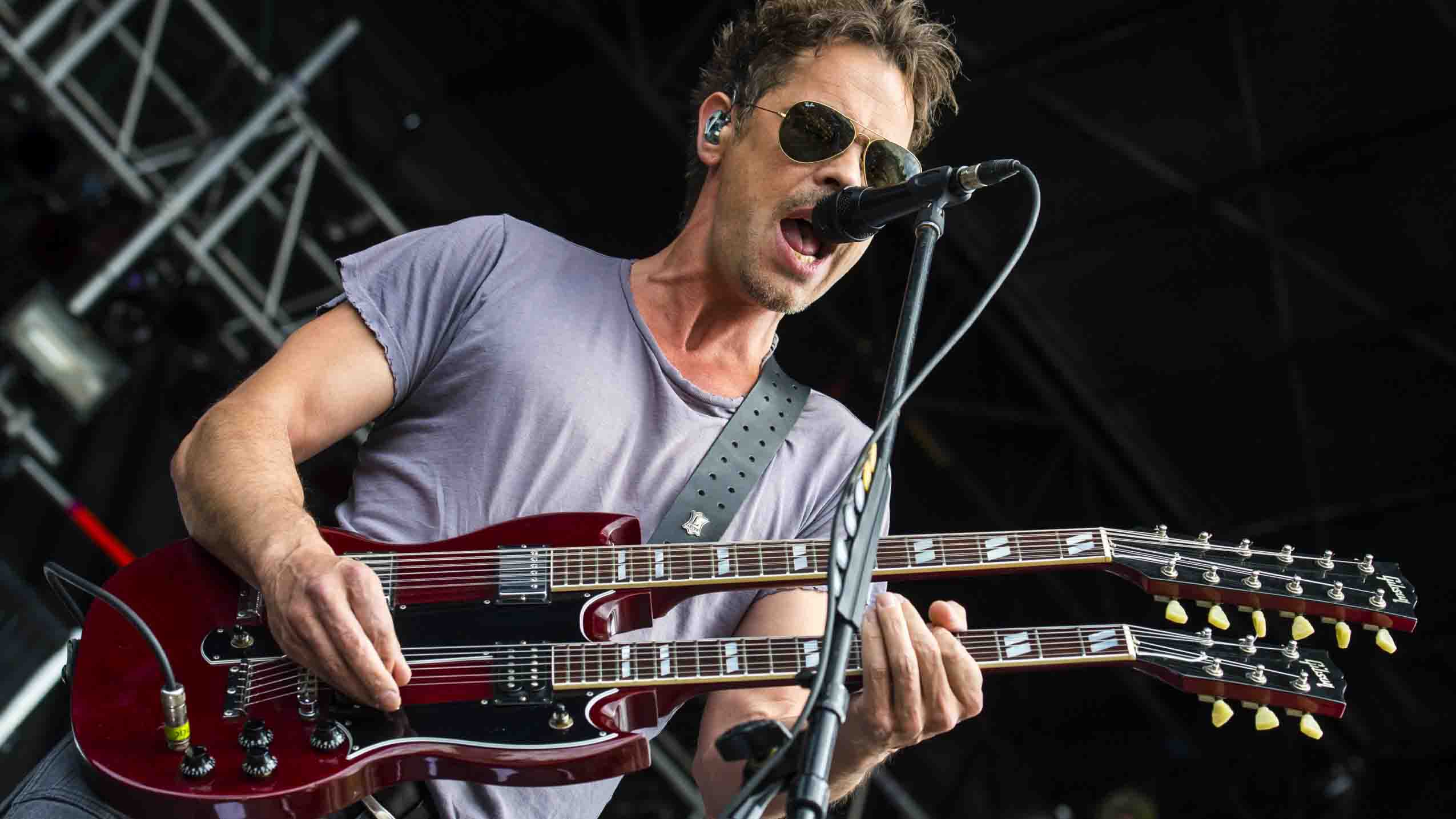
Velvet and vocals
It’s old news for you now to some degree, but some people in the UK won't know that you auditioned for Velvet Revolver. Was the fact that didn’t go any further down to your love of guitar and not wanting to put the instrument down as a frontman?
“Essentially, yes. It just wouldn't have been right, because I wasn't about to do it without a guitar. And I honestly think that's what they were looking for. It's just not me, and I think Slash knew that. The guys were great, and it was still a fun experience but it just wouldn't have been right. I just wouldn't be comfortable standing on stage without a guitar.
“There wasn’t anything weird - it wasn't like 'oil and water'; it wasn't one of those. It was really that they would want a front guy who can run around and whip up the crowd and do that whole thing… more of a Mick - they don't need another Keith, you know what I mean?”
It would have been interesting to hear your voice in that dynamic.
“I had a couple of demos, maybe just one… I don't know. They'd sent me tracks with guitars, bass and drums to write melodies and lyrics [to]. I thought it was great, it really meshed well. And certainly, when we did it in the rehearsal room it sounded great. And I think everybody else thought so, too. And man, I love three guitars. That's what Big Wreck is now. I love the sound of three guitars doing the same thing; it's like nothing else. But it was great – it was a good mix, but just not quite right.”
You're friends with Myles Kennedy, and that's kind of the other side of the coin, in that the people who only know him for singing with Slash might not know what a great guitar player he is…
“Oh yeah. He's great. He's definitely a talent, that guy. He can rip it up on guitar and sing notes only dogs can hear. Unbelievable. And he doesn't seem to age, either – I don't know how he does it. When I first met him, he was a vegetarian and that was in the 90s, so maybe that had something to do with it.”
He's very disciplined on tour when it comes to maintaining his voice; has he offered you any tips?
“Big time. About a year, a year-and-a-half ago, we'd go over Skype, and he'd give me little things you can do. Mostly for maintenance. And that's incredibly helpful. He's very knowledgeable about Bel Canto and all these different techniques, how to approach different vowels when you're way up in your head voice. I would never have known about mix or head voice had it not been for Myles.
“So, once you can apply a term to a feeling, you start to get it. I still can't speak the language or articulate what I know, but I just know that I need certain things in the right place before I go out onstage. And warming up, warming down… all these things. I'm still not as diligent with it as he is. I still have hot sauce when I'm on the road, and coffee more than I should.
“But it is something where I can feel the difference for sure. Taking different kinds of vitamins just to keep from getting sick. If I get sick now, it's over, with post-nasal drip you can't sing with that stuff. And I've tried - I've muscled my way through shows, and it just gets worse. There's nothing worse - I wake up having nightmares about getting sick on the road!”
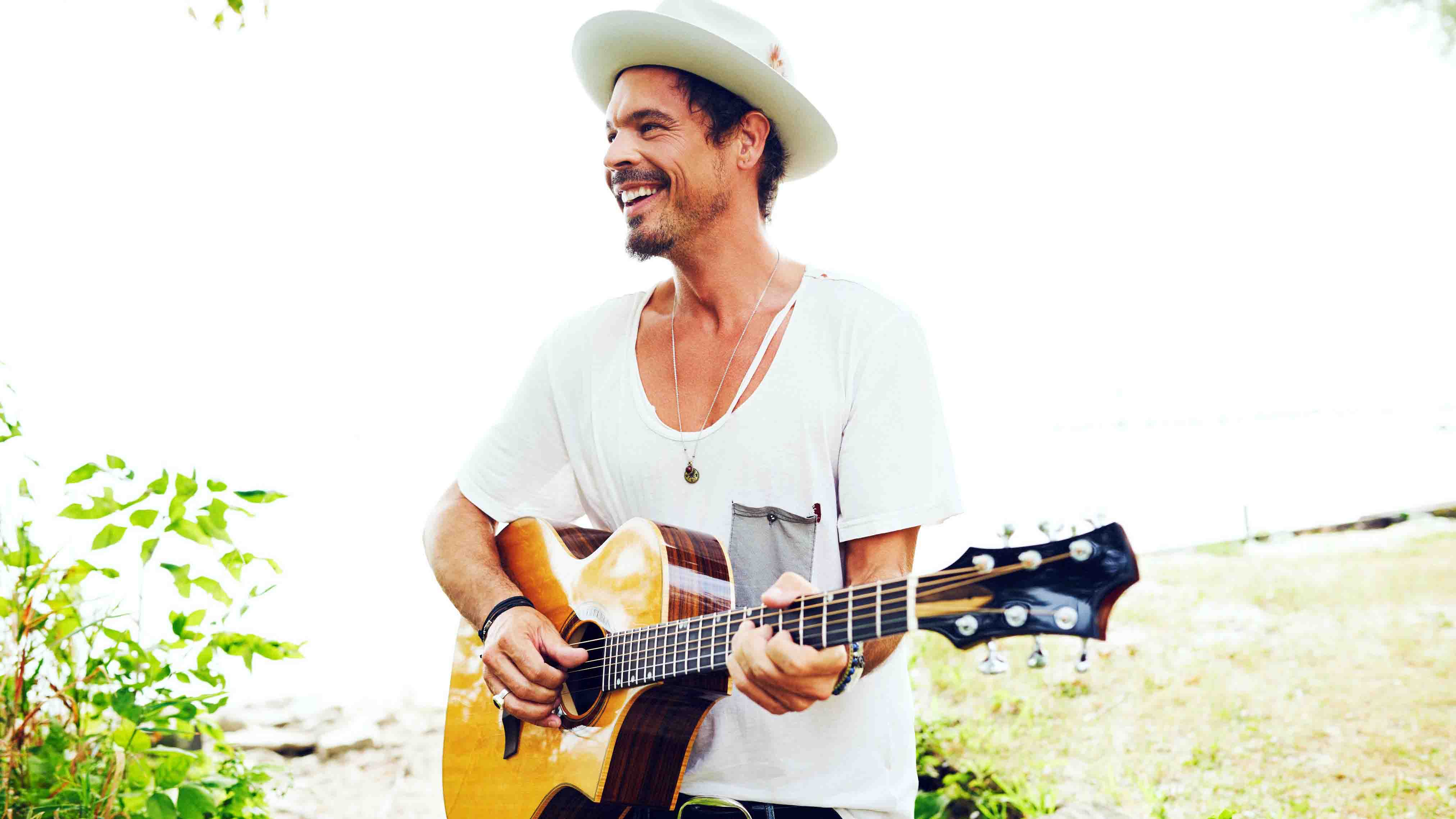
Still learning
As a player, your sense of vibrato is a huge part of your expression; was that something you wanted to develop early on, and were aware of in the players you were hearing?
“I don't know how much time I spent on my vibrato, but I know I jumped on that early. When I started playing electric guitar, that's one of the things my ears tuned into: all these guys have different vibratos.
“Knopfler has this fast one, but it's still very sweet; it's not like a nervous one. And he also does vibrato with his chords. Stevie Ray had one that's wider, but just so thick and a little slow, very soulful. And when you apply the vibrato at the top of the note the whole way through, or at the end of the note… all those things.
“The quicker you can get dialled into that, the better. And certainly I still do it when I stick my left elbow out towards the headstock to get all the way under it! I remember when I was at Berklee, all the jazz guys would laugh at me: 'You can always tell these rock guitar players because they always put the vibrato in.' Yep, and I will never stop!
You can spend just as much time working on vibrato as you can working on your harmonic minor scales
“It's a tough thing to concentrate on… Robben Ford, he doesn't do a lot of it but I think that's part of his tone, part of his thing. It's touch. His vibrato is perfect, it's like the perfect amount of seasoning. And that's the way I would look at it: it's a flavour. Bonamassa has a great one. It just seems like he's taken the time to learn the intricacies and fine-tuning it. It's not like, ‘You just shake the string and you're good.' No, there's a lot more to it.
“You can spend just as much time working on vibrato as you can working on your harmonic minor scales, your alternate picking and your hybrid picking. I want to keep it going. I definitely work on all the things I know about guitar playing and the things I don't know how to do, I work on, too. It's something instinctive that you just know how to do, but you can forget about it.
“I'll want to learn Jeff Beck licks with the whammy bar, so I'll start working on that for a couple of days, and then I’ll have a show, so have to start using all the other stuff I know how to do but haven't really done for a little while. It's important to keep that stuff going.”
It sounds like you still have a real thirst for the guitar.
“Very much so. I've never really done a lot of show-off-y guitar work on albums. There's a couple of things here and there… not show-off-y, but where the guitar really takes the spotlight. It was the least fashionable thing to do when we started, having these long-winded guitar solos on record. We would certainly stretch things out live, but I think it's coming around now, just for me, I don't really give a shit if it's fashionable or not if this song needs a guitar solo.
“So, with the last couple of albums, I've started to do it a little more. Secrets doesn't really have a lot to go off, but I don't think it would work if I started shredding. With Big Wreck, it's great because there's a lot of room for that.
'But I've by no means stopped learning on the guitar. I was up to about 11 o'clock last night, dissecting different guitar solos and trying to steal ideas. I'm never going to have the same vocabulary on tap that Scott Henderson has, but I want to try and work as much of that up as I can, because there are little tricks I can learn from it and maybe try and sprinkle some of that in my own playing. There's a million players who have things you want to learn from, and eventually try to make it your own.”
For more info on Secrets, head over to Ian Fletcher Thornley.
Don't Miss
Famous firsts: Big Wreck's Ian Thornley
Alain Johannes talks lessons learned with Homme, Cornell and Lanegan

Rob is the Reviews Editor for GuitarWorld.com and MusicRadar guitars, so spends most of his waking hours (and beyond) thinking about and trying the latest gear while making sure our reviews team is giving you thorough and honest tests of it. He's worked for guitar mags and sites as a writer and editor for nearly 20 years but still winces at the thought of restringing anything with a Floyd Rose.

